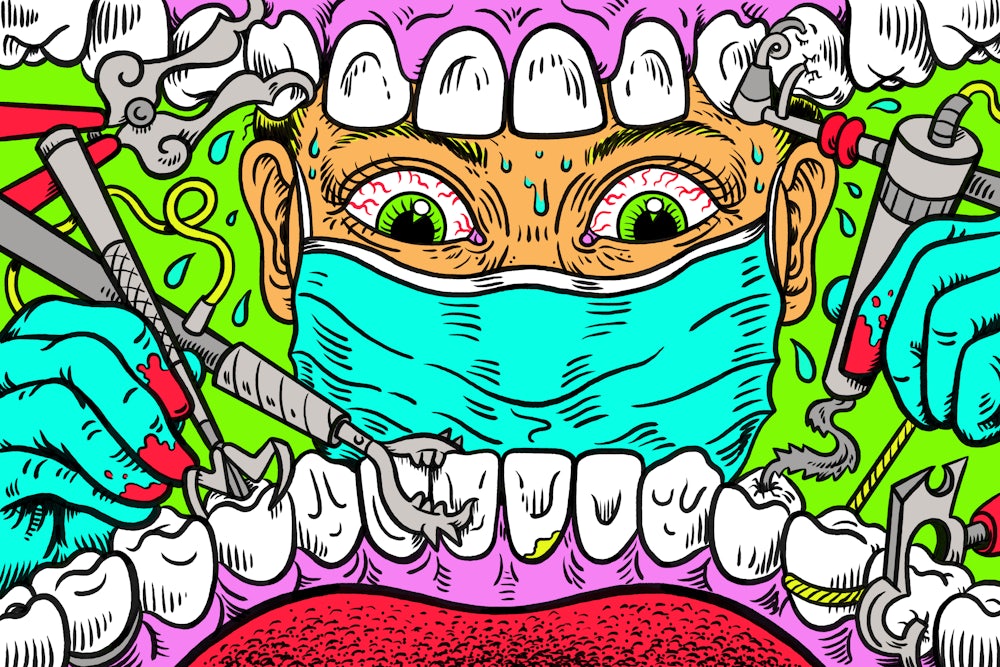Few people enjoy going to the dentist. But generally speaking, we don’t question what’s done to us when we’re there. On Episode 33 of The Politics of Everything, Laura Marsh and Alex Pareene speak with Ferris Jabr and Daryl Austin, two journalists who have investigated dental overtreatment and fraud, about whether we should. It’s impossible to say exactly how widespread gratuitous treatment is—and it can even be difficult to know what constitutes necessary treatment. Because of a lack of reliable research into dentistry practices, because the field operates with minimal oversight and regulation, and because of high costs and dwindling insurance reimbursements, there may be a real incentive to “creatively diagnose,” as one dentist put it. In other words: Get a second opinion. Then get a third.
Ferris Jabr: John Lund was a dentist who practiced in San Jose, California. When he retired, a younger dentist took over his practice. And this new, younger dentist noticed that he wasn’t making nearly as much money as John Lund had reported he was making. Over time, he discovered that John Lund had given many of his patients completely unnecessary treatments and billed them for procedures he had never actually performed.
Laura Marsh: That’s Ferris Jabr talking about John Lund, a dentist who performed 18 root canals on a single patient within five years.
Alex Pareene: Lund was an extreme example of dental malpractice, but was he an isolated one?
Laura: Today we’re talking about dentistry. We’re talking to two reporters, Ferris Jabr and Daryl Austin, who have both written about cases of rampant overtreatment.
Alex: The problem of overtreatment raises questions about what actually constitutes necessary dental treatment. When a dentist says you need a crown, what is that based on? Are dentists held to the same standard as medical doctors?
Laura: Some of these questions have made me feel a lot better about the fact that I have not seen a dentist since the pandemic began. But—and this is a question I’ve asked you before about the subjects—
Alex: Like herbal supplements and bear attacks in small towns—
Laura: I’m wondering what’s political about this.
Alex: Well, dentistry is health care—even if, as some of our listeners may be surprised to learn, it’s not practiced or provided quite the same way as other forms of medical care in the United States. But access to health care, how we pay for it and how the way we pay for it shapes both patient and provider behavior are, of course, very political questions.
I’m Alex Pareene.
Laura: And I’m Laura Marsh.
This is The Politics of Everything.
Alex: Ferris, thank you so much for taking the time to talk to us today.
Ferris: Yeah, thank you for having me.
Alex: So you wrote a terrific feature for The Atlantic magazine about dentistry. Tell us some more about John Roger Lund, who you focus on quite a bit in that story. What kinds of treatments was he subjecting his patients to?
Ferris: The most common procedures were root canals, crowns, and something called an IND, or an incision and drainage. Often John Lund would perform a root canal on someone’s tooth, repair or cap that root canal tooth with a crown, and then also bill them for an incision and drainage, which is usually something that only happens in rare cases where there’s a severe infection. Eventually, quite a few of his former patients sued him, and they won a settlement. The county of Santa Clara is still processing quite a big case against John Lund, mostly for various forms of financial fraud.
Alex: If his successor at his practice hadn’t looked into this, is there any mechanism by which he would have been found out?
Ferris: I don’t know that anybody would have found him out if the new dentist, Brendon Zeidler, hadn’t been so meticulous in tracking all these past records, because he really had to go through years and years, decades’ worth, of patient files to do the statistical analysis to show that the procedures were above average. A typical healthy adult might have one or two root canals in their lifetime. John Lund was performing dozens on an individual patient. So that’s way, way out of the norm.
Laura: It’s funny—because we’re doing this on audio, no one at home will be able to see that I’ve been wincing for the last five minutes.
Alex: Laura has been covering her mouth this whole time.
Laura: Just the words “20 root canals”—it’s really hard to hear about someone going through that and not think how incredibly painful it would be. If this was something that was happening frequently to people who were in his practice, you can’t help imagining there must have been this town or neighborhood where everyone must have thought that they had exceptionally bad teeth. Do patients ever raise a red flag about this kind of thing, and just think, “My teeth can’t be this bad”?
Ferris: I spoke to a number of Lund’s former patients, and the variation was interesting. Some of them have this tough attitude—they would say that the procedures weren’t so bad, they were kind of trying to downplay them. And then others, I think in part because of different pain sensitivities and different thresholds, they were extremely uncomfortable and in a lot of pain from many of the procedures, and told Lund that, but he kept insisting on doing more procedures. And one thing that the new dentist noticed, when he took over Lund’s practice, is that a lot of Lund’s former patients expected to have a lot of work done after being with Lund for so long. They were surprised when the new dentist gave them a clean bill of health and said they didn’t need any more work. That sort of shocked them.
Laura: So this was just what Lund’s patients knew. They thought this was normal. They had no reason, really, to question it.
Alex: Part of the reason Lund was able to get away with this for so long is how the field of dentistry itself is structured in the United States. There are just not many provisions in place that would prevent what he did.
Ferris: Most doctors will end up working for a large health care organization or a hospital with quite a bit of oversight, but the vast majority of dentists in the U.S. open up their own practices, so they mostly answer to themselves. There are ethical guidelines and codes that they’re supposed to follow, but there isn’t somebody looking over their shoulder day to day.
Laura: No one’s even collecting those numbers, those stats, generally, of how many procedures a dentist is doing on an individual patient. All of that stuff is proprietary information to the business.
Ferris: Yes. And this particular problem of overtreatment, unnecessary treatment, is very poorly studied. It’s really difficult to find any kind of comprehensive statistics about it. You can find numbers of more general infractions that dentists make in the U.S. from year to year, but even that information tends to be rather codified and restricted to these pretty obscure trade journals, and it can be quite pricey to get that information if you’re not part of the dental community.
Laura: Lund is an outlier, an extreme example of a dentist engaging in overtreatment. But one thing that can be scary about hearing about dentists like him is that it’s so easy to imagine yourself in the shoes of his patients. And it’s so hard as a patient to evaluate the advice we’re given. Often seeking a second or third opinion just complicates things even further.
Alex: We talked to the independent journalist Daryl Austin, who wrote an article for Kaiser Health News and USA Today about dental fraud. Daryl told us about the experience he had that made him want to start investigating the field of dentistry.
Daryl Austin: I have a daughter who’s just turned 10, and she needed braces last year. We went to an orthodontist who was recommended to us, and it was several thousand dollars for the treatment that she needed before he would even consider braces. So we decided to seek out a second opinion, and that dentist had a completely different take. Not one thing was similar to what the first dentist had said. His cost was a little bit less. A third dentist, his cost was around $8,000. And then our last dentist recommended a treatment option that was about $800.
Laura: So you’re off by a factor of 10 between those two.
Daryl: Exactly. And I began to realize that there are—I learned that the term is “dental philosophy.” So there are different dental philosophies that a lot of dentists have that don’t even begin to get into the space of fraud necessarily but that are just a dentist saying, “I’m more aggressive in my treatment plans,” and another dentist says, “I’m more conservative, and I want to take a softer approach.” And you don’t know, as a consumer, what type of philosophy your dentist has.
Laura: I think that the assumption that I would have come in with, and I think a lot of people would come in with, is that you go to the dentist and there is a distinct problem with your teeth. And there’s probably a small number of solutions to that problem. And you would imagine most dentists would agree broadly on what needs to be done. What you’re saying is everyone was identifying different problems, different solutions, they range wildly in price. And that sort of raises this question of what is the science of dentistry? Are there objective things we can agree about here that need to be done as treatments? What does it mean to have healthy teeth, if there’s so much disagreement on diagnosis and treatment?
Daryl: That’s really the issue, Laura—there isn’t consensus. I mean, most Americans think of the American Dental Association as this compilation of all of these rules, and these are the things they have to follow. And the ADA did tell me that there are guidelines that they expect dentists to adhere to. They are more ethical guidelines. There’s not really a specific prognosis for “Problem A deserves Treatment Plan A” and Problem B....” It’s not really like that.
Alex: I find it interesting that when you might see the ADA quoted in the newspaper, you might think of it primarily as a medical organization. But I think you’re saying it’s almost more a sort of professional association, right? Advancing the interests of dentistry as a profession.
Daryl: That’s exactly right. And they made it very clear to me, “We are not a regulatory agency.” There are certain standards that dentists have to keep in order to be considered an ADA-qualified dentist, But as far as going in and investigating what’s going on, the ADA does nothing like that. A regulation is supposed to exist on the state level in what are called dental boards, but it’s more of an examining body. If I have an issue, like I want to report a dentist who I think has treated me poorly, I can go to the state dental board, and they will investigate it. In that way they’re a regulatory body, but they’re not out there checking in with dentists—in any way that I found, anyway.
Laura: We’ve been talking to Daryl about the minimal regulation and enforcement in the field of dentistry.
Alex: After a short break, we’ll be back to talk about how that lack can be traced in part to the divide between dentistry and medicine.
Alex: Before the break, we were talking about the lack of regulation in dentistry.
Laura: Ferris traces that lack of regulation in part to the divide between medicine and dentistry, a divide that has a long history.
Alex: While prepping for this episode, we were just constantly sharing our own stories of dentist visits—questioning past visits, and just wondering, like, was that dentist right? Was that necessary? You mentioned how the business of dentistry departs from a lot of how medicine is performed in the U.S., and that difference goes back quite a ways.
Ferris: Yeah, there’s a very long, rich, fascinating, morbid history of dentistry in the U.S., and how it departed from medicine or stayed apart from medicine for a very long time.
Laura: If you go back to the 1700s or 1800s, dentistry wasn’t considered a medical profession.
Ferris: It was more like a trade, almost like blacksmithing or something like that. And a lot of the people who call themselves dentists or barber surgeons would perform a wide range of very basic and crude procedures—everything from using leeches to bandaging people up to wrenching teeth out of their mouth if they were too infected or it was causing too much pain. And then over time, dentists in the 1800s tried to integrate into medical universities and were basically rebuffed by the doctors and professors who did not consider dentistry to be worthy of integration into mainstream medical education. So dentistry formed its own independent track and has evolved on its own track since then. It’s just four years. You can choose to specialize in something after those four years, or you can get your license and start practicing right away. So there is generally less training involved.
Alex: So people might assume that dentists are trained like other doctors, but in fact, these differences remain, and dentistry has actually been late to catch up to a lot of things other medical scientists take for granted, including even the idea that there should be evidence to support common practices and procedures.
Ferris: There’s this whole movement called evidence-based medicine. And it also has a very long history: It started at least in the 1960s. Some scholars think you can trace it back centuries. And dentistry didn’t start having the same conversations until probably the mid-1990s. The whole idea of evidence-based medicine is, “We need to move focus away from received wisdom and intuition and kind of the old ways of doing medicine and toward the results of highly controlled empirical studies.”
Laura: The trouble for dentistry is that there simply isn’t a strong body of evidence backing up even many of the most common dental procedures that we take for granted.
Ferris: The data is inconsistent and inconclusive, and it’s very difficult to say definitively that even something like flossing for plaque definitely works. And I think most people aren’t aware of that—we just kind of assume that these things have been tested. When a dentist says to you that there’s something wrong, that you need to have something done, most of us have no idea, we don’t have the expertise required to contradict them. Even if we did go to the research literature, we wouldn’t necessarily find much compelling data to help us make a decision.
Laura: Well, that bit of doubt about flossing makes me feel a lot better—anything to rationalize not flossing.
Alex: If dentists aren’t using empirical evidence from controlled studies to decide what to do in your mouth, how are they deciding what to do in your mouth?
Ferris: You will hear words like “experience.” Some dentists will even say “dentistry is an art.” And it’s like, well, I don’t really know if I want an artist performing surgeries in my mouth. So it’s all about that person’s individual expertise, supposedly, and their good judgment. A few dentists in the piece say several times that the majority of dentists really are ethical, and they really are trying to be as judicious as possible and to be prudent and cautious, taking the wait and watch approach. Like, if it seems like there’s something going on, the best thing to do is to wait a little bit, try better hygiene, see what happens before rushing into a procedure. But when you look at newspaper archives and lawsuits and complaints coming from within the dental office itself, you can clearly see that overtreatment is a problem. There are so many psychological and medical factors that come together to allow for the opportunity for overtreatment.
Laura: It is shocking when you think about it. I mean, I’ve been to the dentist for a cleaning and at the end of the visit, they’ll say, “Your teeth are kind of crooked. Are you interested in getting them straightened?” This would be the equivalent of if I went to the doctor and they said, “Well, we’ve done your annual checkup, but do you want some help losing weight?” It’s like drawing attention to an insecurity and then saying, “I can help.”
Alex: Actually, it’s even more like, after your physical, they’re like, “All right, while you’re here, facelift?”
Ferris: Exactly. And so there’s something interesting has happened during the pandemic, which is that I think a lot of people have not been going to the dentist nearly as frequently, because we’ve all been trying to sort of avoid anything that isn’t absolutely essential. And of course the maxim that we’ve all grown up with is that you should go to the dentist twice a year, every six months. But it turns out there’s no scientific backing for that maxim, and some scholars have even traced it to a toothpaste commercial from decades ago, or possibly even to a pamphlet from the 1800s. And most dentists these days agree that if you’re an adult with good oral hygiene, you probably don’t need to go to the dentist more than once every 12 to 16 months.
Alex: Ferris talked about how the field of dentistry developed separately for medicine and how that still affects the way it works today. But that’s just one piece of it. Daryl Austin also talked about how dentists make money, and the economic incentive to overtreat patients. Here’s Daryl.
Daryl: One of the dentists I interviewed actually said, “I see myself as a business owner first and a dentist second.” Meaning, of course, that they wanted to do right by their patients, but that they see it as a business. In fact, I think sometimes when I see a new dentist office pop up around the corner and they’ve got all these banners and stuff, and they’ve got balloons, I’m like, it’s not really that different than a new restaurant opening up down the road. They’ve got to bring in new clientele, and they’ve got to market just the same as anybody else does. And just because they provide service A is not necessarily that different than other service-based industries.
Laura: Can we break that down a little bit? What services are they relying on to become sustainable practices? Because you can go for tooth whitening or you could go for tooth cleanings, but then there are the more expensive services like root canals, crowns—you can start racking up some quite frightening bills when you go to the dentist. What are the different levels of services, and what kinds of incentives do the dentists have to push toward those more expensive treatments?
Daryl: One thing that I looked at in this process and developed some empathy for was the fact that I had a number of dentists tell me, “If I’m only doing the basic care, I’m not able to keep my practice afloat anymore.” Most of the insurance rates were established back in the 1960s and 1970s, and many insurance companies still adhere to those same rates today, the amounts that they’re willing to reimburse dentists for. So it becomes imperative to make up that difference somewhere. They need you to come in more often for cleanings. They need you to have more aggressive cleaning, this quadrant scaling where it’s, they basically go to the whole gum line. And it’s like, anywhere between a $900 and $1,200 procedure versus a $100 cleaning. They needed to push x-rays that maybe you don’t necessarily need. You don’t realize as you’re just sitting there in the chair—each of those little things is billed differently to an insurer. There are so many different ways in which dentists can make more money from your mouth than just the standard filling, and lots of them see you as a patient that way.
Alex: You made a very important point, too, which is that it’s not to say that greedy dentists everywhere are committing fraud, but that the incentives are there for them to perform unnecessary procedures sometimes, for them to lean toward certain more well-reimbursed procedures and away from other less well-reimbursed ones. If you had designed a system to encourage abuse and excess and fraud, it would look a lot like the way insurance reimbursement works for dentistry.
Daryl: Yes. The most evidence of fraud from the people I interviewed was in corporate dentist chains. These are chains that have basically gone in, they see a dentist struggling—and unfortunately I think this happened quite a bit more during the pandemic—and they’ll make a lump sum offer and say, we want to buy you out. And the best part for the dentist is, most of the time that dentist gets to stay on. In fact, a lot of people are seeing the mom and pop shop dentist office around the corner, and don’t realize that the back end is now being run by somebody at a corporate dentist chain. And so these chains will come in and establish totally different standards and incentives for all the dentists working for them. And they either go along with it or they’re shown the door.
Alex: I’m just going to read this quote from one of your sources who was a dentist, I believe.
Daryl: Yeah, he is—Dr. Silber.
Alex: So these corporations and chains are buying these small practices; private equity money is sometimes involved. And Dr. Silber says, when that happens, “The executive at the top tells the dentists working for them which procedures to push, like a chef tells their team of waiters to push the daily special.”
Daryl: That’s exactly right. There’s a dentist who said whoever could do the most quadrant scaling procedures was offered a cruise at the end of a month from a corporate chain. There was another one that was for crown procedures—they got a bonus for the number of crown procedures they could perform in a month. A mom and pop business around the corner is totally different than a dental office that accepts Medicaid. And one that works with certain insurance companies is going to have different procedures than one that works with others.
Alex: So where there is outright fraud, where in this sort of world of dentistry is that the most common?
Daryl: Absolutely in cases of Medicaid. If a dentist bills a private insurer for too much treatment, it’s going to get flagged at least by the insurance company. Nobody else will probably care, but the insurance company cares. And so with Medicaid, on one hand, Medicaid actually pays a lot less for certain procedures than some private insurance companies, but on the other hand, there are some loopholes in Medicaid that don’t exist with private insurance companies. And there’s less oversight. It’s a system that can be taken advantage of easily. In fact, one of the examples we listed in our article was the dentist who was literally sending his staff to go to a dollar store around the corner, buying these little mouth guards, and then bringing them back to his clinic, melting them down a little bit so that they would get soft and malleable, and then he was inserting them into the patient’s mouth. We’re literally talking like a dollar, $2, $3, plastic device, this is something that they would wear for like a football game, and he’d put it in and tell them that was it. And then he would turn around and bill Medicaid $90 or $100 for each of those. We’re talking a scam that he profited more than a million dollars from.
Laura: That example I really like, because I think it shows that some of the fraud you’re describing exists on a spectrum from outrageous fraud—which is, you would use the word scam, someone knowingly buying dollar-store mouth guards and marking them up. And then on the other end of the spectrum, it seems like there’s just a kind of mission creep. A kind of, “Well, you know, you could do it this way, or you could do the more expensive one, we’ll go with the more expensive one.” A kind of silent move toward overtreatment just because you’re going to try to make things work business-wise.
It seems like the harms here are: one, it costs a lot of money. And then, two, you are having parts of your body removed in some cases, with the crown, that you could actually have kept. Is that fair?
Daryl: Yes.
Laura: I mean, there’s, there’s a long-term implication there, right? Because if you have a crown, it doesn’t last forever.
Daryl: No, you’re exactly right. In fact, sadly, the most common victims by far are our children, because they’re going to complain either way, and their parents are expecting that. And because their teeth aren’t already all in their proper place, it’s really easy to get away with a cap that doesn’t need it, or a type of implant that wouldn’t hold for as long. There was a case of one corporate chain where a mother had come in, she thought she was just getting a regular checkup, and her baby had like three different teeth pulled on one side and two on the other side, and the whole mouth bloody, they had done these pulpotomies, and the dentist said it was all necessary. He ended up being disbarred or removed—he lost his license.
Laura: This was on a small child with their first set of teeth. I mean, what’s even the point in doing that kind of work on teeth the child is not going to ultimately have anyway?
Daryl: Especially think about it for a child, the fear associated with going to the dentist for the rest of your life started with an experience where you had this baby root canal that was needless.
Alex: It intuitively makes sense that there would be a lot of unnecessary treatment and outright fraud on children’s dentistry because the evidence will literally all just fall out. You’re not going to catch it on an x-ray years later on.
Laura: But then with an adult there are more long-term harms, right? I’ve read horror stories of people who’ve ended up having crowns on nearly all of their molars, for instance. And if you’ve got that, you’re looking at every 10, 15 years, tens of thousands of dollars’ worth of dental work to replace these things, often intrusive dental work, very expensive. You kind of stuck with it for the rest of your life.
Daryl: Yes. And one of the areas that we talk about with adults are the “thumbtack” implants, which are different from the permanent kind of implant that most dentists usually use. They’ll put this little bolt into your mouth and it’s meant to just hold dentures, that’s the reason it was designed, but they’re now using it as an implant. And those things come out every year or two, and they’re billing it just as if it was a standard implant, which is close to $1,000. So you’re going in every few years, and you don’t understand why you need it. You have no idea why that thing keeps coming out, and it’s because they were putting in the cheap version of what they needed to install in the first place.
Laura: It’s all pretty horrifying. What do you think the solutions are?
Daryl: Well, I definitely think the industry needs to be more heavily regulated. There needs to be some oversight, not just oversight that exists when situations are reported, but checking in and making sure that there are standards that are being met. That would be a truly dramatic measure to overhaul this entire industry. But I think that there needs to be some accountability in all of these cases. I also think dentists need to be able to say why they recommended a certain treatment plan, that’s not too difficult to do—maybe to their dental board or somebody who can oversee how that’s done. As far as the patient is concerned, there’s nothing wrong with asking, “Is there a cheaper option available? Is that necessary?
Alex: We’ve talked about the kind of oversight that’s needed and what patients can do to protect themselves. But what do dentists think about these allegations about their industry?
Laura: Ferris Jabr’s article was published back in 2019.
Alex: Ferris, since that came out, have you heard from many dentists?
Ferris: Oh yes, especially immediately following the article. I got a huge number of emails and tweets and a lot of hate mail from the dentists. What was interesting, though, is that it was almost evenly split between dentists who were saying, “Thank you for writing about this, for bringing these issues to the fore,” and then the other half was a lot of dental professionals who are somewhat understandably incensed because they feel like their profession is being attacked. And I can understand that—dentistry gets such a bad rap in so many ways. I do wish that more people had paid attention to the contrast between John Lund and the new dentist, Brendon Zeidler, because part of the idea was to show that there is a huge variation in how different dentists behave, and Brendon Zeidler is a very upstanding dental practitioner and followed all the ethical guidelines to a T. People who didn’t like the article just conveniently ignored his presence.
I think for me, the bottom line is empowering patients with this knowledge. I just think people need to know this—they need to be informed going into the dentist office.
Laura: Ferris Jabr’s article, “The Truth About Dentistry,” was published in The Atlantic in 2019.
Alex: Daryl Austin’s piece, “Why Your Dentist Might Seem Pushy,” was published by Kaiser Health News in May.








